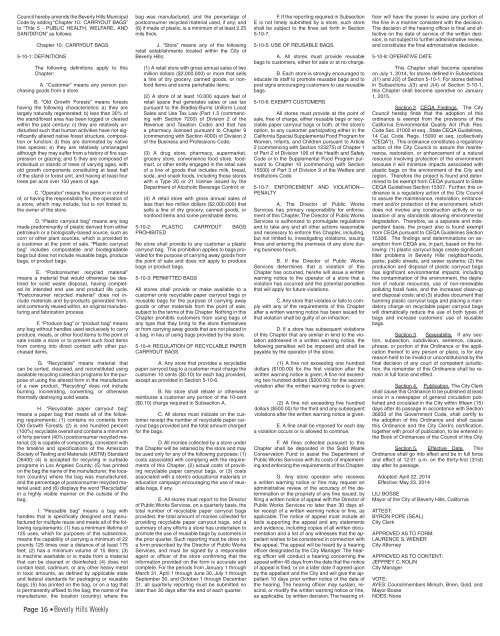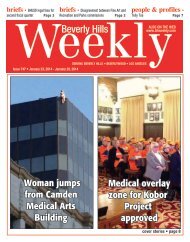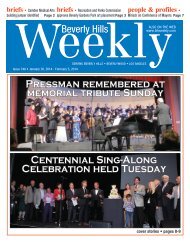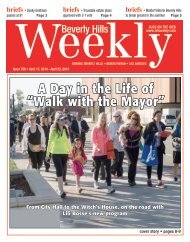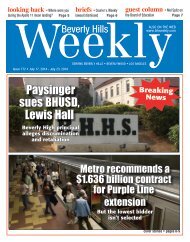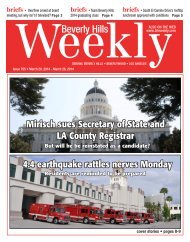1msgpqB
1msgpqB
1msgpqB
Create successful ePaper yourself
Turn your PDF publications into a flip-book with our unique Google optimized e-Paper software.
Council hereby amends the Beverly Hills Municipal<br />
Code by adding “Chapter 10: CARRYOUT BAGS”<br />
to “Title 5 - PUBLIC HEALTH, WELFARE, AND<br />
SANITATION” as follows:<br />
Chapter 10: CARRYOUT BAGS<br />
5-10-1: DEFINITIONS<br />
The following definitions apply to this<br />
Chapter:<br />
A. “Customer” means any person purchasing<br />
goods from a store.<br />
B. “Old Growth Forests” means forests<br />
having the following characteristics: a) they are<br />
largely naturally regenerated; b) less than 30% of<br />
the stand/forest area has been logged or cleared<br />
within the past century; c) they are relatively undisturbed<br />
such that human activities have not significantly<br />
altered native forest structure, composition<br />
or function; d) they are dominated by native<br />
tree species; e) they are relatively unmanaged<br />
although they may suffer from a history of fire suppression<br />
or grazing; and f) they are composed of<br />
individual or stands of trees of varying ages, with<br />
old growth components constituting at least half<br />
of the stand or forest unit, and having at least four<br />
trees per acre over 150 years of age.<br />
C. “Operator” means the person in control<br />
of, or having the responsibility for, the operation of<br />
a store, which may include, but is not limited to,<br />
the owner of the store.<br />
D. “Plastic carryout bag” means any bag<br />
made predominantly of plastic derived from either<br />
petroleum or a biologically-based source, such as<br />
corn or other plant sources, which is provided to<br />
a customer at the point of sale. “Plastic carryout<br />
bag” includes compostable and biodegradable<br />
bags but does not include reusable bags, produce<br />
bags, or product bags.<br />
E. “Postconsumer recycled material”<br />
means a material that would otherwise be destined<br />
for solid waste disposal, having completed<br />
its intended end use and product life cycle.<br />
“Postconsumer recycled material” does not include<br />
materials and by-products generated from,<br />
and commonly reused within, an original manufacturing<br />
and fabrication process.<br />
F. “Produce bag” or “product bag” means<br />
any bag without handles used exclusively to carry<br />
produce, meats, or other food items to the point of<br />
sale inside a store or to prevent such food items<br />
from coming into direct contact with other purchased<br />
items.<br />
G. “Recyclable” means material that<br />
can be sorted, cleansed, and reconstituted using<br />
available recycling collection programs for the purpose<br />
of using the altered form in the manufacture<br />
of a new product. “Recycling” does not include<br />
burning, incinerating, converting, or otherwise<br />
thermally destroying solid waste.<br />
H. “Recyclable paper carryout bag”<br />
means a paper bag that meets all of the following<br />
requirements: (1) contains no contents from<br />
Old Growth Forests; (2) is one hundred percent<br />
(100%) recyclable overall and contains a minimum<br />
of forty percent (40%) postconsumer recycled material;<br />
(3) is capable of composting, consistent with<br />
the timeline and specifications of the American<br />
Society of Testing and Materials (ASTM) Standard<br />
D6400; (4) is accepted for recycling in curbside<br />
programs in Los Angeles County; (5) has printed<br />
on the bag the name of the manufacturer, the location<br />
(country) where the bag was manufactured,<br />
and the percentage of postconsumer recycled material<br />
used; and (6) displays the word “Recyclable”<br />
in a highly visible manner on the outside of the<br />
bag.<br />
I. “Reusable bag” means a bag with<br />
handles that is specifically designed and manufactured<br />
for multiple reuse and meets all of the following<br />
requirements: (1) has a minimum lifetime of<br />
125 uses, which for purposes of this subsection,<br />
means the capability of carrying a minimum of 22<br />
pounds 125 times over a distance of at least 175<br />
feet; (2) has a minimum volume of 15 liters; (3)<br />
is machine washable or is made from a material<br />
that can be cleaned or disinfected; (4) does not<br />
contain lead, cadmium, or any other heavy metal<br />
in toxic amounts, as defined by applicable state<br />
and federal standards for packaging or reusable<br />
bags; (5) has printed on the bag, or on a tag that<br />
is permanently affixed to the bag, the name of the<br />
manufacturer, the location (country) where the<br />
bag was manufactured, and the percentage of<br />
postconsumer recycled material used, if any; and<br />
(6) if made of plastic, is a minimum of at least 2.25<br />
mils thick.<br />
J. “Store” means any of the following<br />
retail establishments located within the City of<br />
Beverly Hills:<br />
(1) A retail store with gross annual sales of two<br />
million dollars ($2,000,000) or more that sells<br />
a line of dry grocery, canned goods, or nonfood<br />
items and some perishable items;<br />
(2) A store of at least 10,000 square feet of<br />
retail space that generates sales or use tax<br />
pursuant to the Bradley-Burns Uniform Local<br />
Sales and Use Tax Law (Part 1.5 (commencing<br />
with Section 7200) of Division 2 of the<br />
Revenue and Taxation Code) and that has<br />
a pharmacy licensed pursuant to Chapter 9<br />
(commencing with Section 4000) of Division 2<br />
of the Business and Professions Code;<br />
(3) A drug store, pharmacy, supermarket,<br />
grocery store, convenience food store, foodmart,<br />
or other entity engaged in the retail sale<br />
of a line of goods that includes milk, bread,<br />
soda, and snack foods, including those stores<br />
with a Type 20 or 21 license issued by the<br />
Department of Alcoholic Beverage Control; or<br />
(4) A retail store with gross annual sales of<br />
less than two million dollars ($2,000,000) that<br />
sells a line of dry grocery, canned goods, or<br />
nonfood items and some perishable items.<br />
5-10-2: PLASTIC CARRYOUT BAGS<br />
PROHIBITED<br />
No store shall provide to any customer a plastic<br />
carryout bag. This prohibition applies to bags provided<br />
for the purpose of carrying away goods from<br />
the point of sale and does not apply to produce<br />
bags or product bags.<br />
5-10-3: Permitted bags<br />
All stores shall provide or make available to a<br />
customer only recyclable paper carryout bags or<br />
reusable bags for the purpose of carrying away<br />
goods or other materials from the point of sale,<br />
subject to the terms of this Chapter. Nothing in this<br />
Chapter prohibits customers from using bags of<br />
any type that they bring to the store themselves<br />
or from carrying away goods that are not placed in<br />
a bag, in lieu of using bags provided by the store.<br />
5-10-4: Regulation of recyclable PAPER<br />
CARRYOUT bags<br />
A. Any store that provides a recyclable<br />
paper carryout bag to a customer must charge the<br />
customer 10 cents ($0.10) for each bag provided,<br />
except as provided in Section 5-10-6.<br />
B. No store shall rebate or otherwise<br />
reimburse a customer any portion of the 10-cent<br />
($0.10) charge required in Subsection A.<br />
C. All stores must indicate on the customer<br />
receipt the number of recyclable paper carryout<br />
bags provided and the total amount charged<br />
for the bags.<br />
D. All monies collected by a store under<br />
this Chapter will be retained by the store and may<br />
be used only for any of the following purposes: (1)<br />
costs associated with complying with the requirements<br />
of this Chapter, (2) actual costs of providing<br />
recyclable paper carryout bags, or (3) costs<br />
associated with a store’s educational materials or<br />
education campaign encouraging the use of reusable<br />
bags, if any.<br />
E. All stores must report to the Director<br />
of Public Works Services, on a quarterly basis, the<br />
total number of recyclable paper carryout bags<br />
provided, the total amount of monies collected for<br />
providing recyclable paper carryout bags, and a<br />
summary of any efforts a store has undertaken to<br />
promote the use of reusable bags by customers in<br />
the prior quarter. Such reporting must be done on<br />
a form prescribed by the Director of Public Works<br />
Services, and must be signed by a responsible<br />
agent or officer of the store confirming that the<br />
information provided on the form is accurate and<br />
complete. For the periods from January 1 through<br />
March 31, April 1 through June 30, July 1 through<br />
September 30, and October 1 through December<br />
31, all quarterly reporting must be submitted no<br />
later than 30 days after the end of each quarter.<br />
F. If the reporting required in Subsection<br />
E is not timely submitted by a store, such store<br />
shall be subject to the fines set forth in Section<br />
5-10-7.<br />
5-10-5: Use of reusable bags.<br />
A. All stores must provide reusable<br />
bags to customers, either for sale or at no charge.<br />
B. Each store is strongly encouraged to<br />
educate its staff to promote reusable bags and to<br />
post signs encouraging customers to use reusable<br />
bags.<br />
5-10-6: Exempt customers<br />
All stores must provide at the point of<br />
sale, free of charge, either reusable bags or recyclable<br />
paper carryout bags or both, at the store’s<br />
option, to any customer participating either in the<br />
California Special Supplemental Food Program for<br />
Women, Infants, and Children pursuant to Article<br />
2 (commencing with Section 123275) of Chapter 1<br />
of Part 2 of Division 106 of the Health and Safety<br />
Code or in the Supplemental Food Program pursuant<br />
to Chapter 10 (commencing with Section<br />
15500) of Part 3 of Division 9 of the Welfare and<br />
Institutions Code.<br />
5-10-7: Enforcement and VIOLATION—<br />
PENALTY<br />
A. The Director of Public Works<br />
Services has primary responsibility for enforcement<br />
of this Chapter. The Director of Public Works<br />
Services is authorized to promulgate regulations<br />
and to take any and all other actions reasonable<br />
and necessary to enforce this Chapter, including,<br />
but not limited to, investigating violations, issuing<br />
fines and entering the premises of any store during<br />
business hours.<br />
B. If the Director of Public Works<br />
Services determines that a violation of this<br />
Chapter has occurred, he/she will issue a written<br />
warning notice to the operator of a store that a<br />
violation has occurred and the potential penalties<br />
that will apply for future violations.<br />
C. Any store that violates or fails to comply<br />
with any of the requirements of this Chapter<br />
after a written warning notice has been issued for<br />
that violation shall be guilty of an infraction.<br />
D. If a store has subsequent violations<br />
of this Chapter that are similar in kind to the violation<br />
addressed in a written warning notice, the<br />
following penalties will be imposed and shall be<br />
payable by the operator of the store:<br />
(1) A fine not exceeding one hundred<br />
dollars ($100.00) for the first violation after the<br />
written warning notice is given; A fine not exceeding<br />
two hundred dollars ($200.00) for the second<br />
violation after the written warning notice is given;<br />
or<br />
(2) A fine not exceeding five hundred<br />
dollars ($500.00) for the third and any subsequent<br />
violations after the written warning notice is given.<br />
E. A fine shall be imposed for each day<br />
a violation occurs or is allowed to continue.<br />
F. All fines collected pursuant to this<br />
Chapter shall be deposited in the Solid Waste<br />
Conservation Fund to assist the Department of<br />
Public Works Services with its costs of implementing<br />
and enforcing the requirements of this Chapter.<br />
G. Any store operator who receives<br />
a written warning notice or fine may request an<br />
administrative review of the accuracy of the determination<br />
or the propriety of any fine issued, by<br />
filing a written notice of appeal with the Director of<br />
Public Works Services no later than 30 days after<br />
receipt of a written warning notice or fine, as<br />
applicable. The notice of appeal must include all<br />
facts supporting the appeal and any statements<br />
and evidence, including copies of all written documentation<br />
and a list of any witnesses that the appellant<br />
wishes to be considered in connection with<br />
the appeal. The appeal will be heard by a hearing<br />
officer designated by the City Manager. The hearing<br />
officer will conduct a hearing concerning the<br />
appeal within 45 days from the date that the notice<br />
of appeal is filed, or on a later date if agreed upon<br />
by the appellant and the City and will give the appellant<br />
10 days prior written notice of the date of<br />
the hearing. The hearing officer may sustain, rescind,<br />
or modify the written warning notice or fine,<br />
as applicable, by written decision. The hearing officer<br />
will have the power to waive any portion of<br />
the fine in a manner consistent with the decision.<br />
The decision of the hearing officer is final and effective<br />
on the date of service of the written decision,<br />
is not subject to further administrative review,<br />
and constitutes the final administrative decision.<br />
5-10-8: Operative date<br />
This Chapter shall become operative<br />
on July 1, 2014, for stores defined in Subsections<br />
J(1) and J(2) of Section 5-10-1. For stores defined<br />
in Subsections J(3) and J(4) of Section 5-10-1,<br />
this Chapter shall become operative on January<br />
1, 2015.<br />
Section 2. CEQA Findings. The City<br />
Council hereby finds that the adoption of this<br />
ordinance is exempt from the provisions of the<br />
California Environmental Quality Act (Pub. Res.<br />
Code Sec. 21000 et seq., State CEQA Guidelines,<br />
14 Cal. Code. Regs. 15000 et seq. (collectively<br />
“CEQA”)). This ordinance constitutes a regulatory<br />
action of the City Council to assure the maintenance,<br />
restoration, or enhancement of a natural<br />
resource involving protection of the environment<br />
because it will minimize impacts associated with<br />
plastic bags on the environment of the City and<br />
region. Therefore the project is found and determined<br />
to be exempt from CEQA pursuant to State<br />
CEQA Guidelines Section 15307. Further, this ordinance<br />
is a regulatory action of the City Council<br />
to assure the maintenance, restoration, enhancement<br />
and/or protection of the environment, which<br />
does not involve any construction activity or relaxation<br />
of any standards allowing environmental<br />
degradation. Therefore, as a separate and independent<br />
basis, the project also is found exempt<br />
from CEQA pursuant to CEQA Guidelines Section<br />
15308. The findings and determinations on exemption<br />
from CEQA are, in part, based on the following:<br />
(1) plastic carryout bags create significant<br />
litter problems in Beverly Hills’ neighborhoods,<br />
parks, public streets, and sewer systems; (2) the<br />
production and disposal of plastic carryout bags<br />
has significant environmental impacts, including<br />
the contamination of the environment, the depletion<br />
of natural resources, use of non-renewable<br />
polluting fossil fuels, and the increased clean-up<br />
and disposal costs; and (3) studies document that<br />
banning plastic carryout bags and placing a mandatory<br />
charge on recyclable paper carryout bags<br />
will dramatically reduce the use of both types of<br />
bags and increase customers’ use of reusable<br />
bags.<br />
Section 3. Severability. If any section,<br />
subsection, subdivision, sentence, clause,<br />
phrase, or portion of this Ordinance or the application<br />
thereof to any person or place, is for any<br />
reason held to be invalid or unconstitutional by the<br />
final decision of any court of competent jurisdiction,<br />
the remainder of this Ordinance shall be remain<br />
in full force and effect.<br />
Section 4. Publication. The City Clerk<br />
shall cause this Ordinance to be published at least<br />
once in a newspaper of general circulation published<br />
and circulated in the City within fifteen (15)<br />
days after its passage in accordance with Section<br />
36933 of the Government Code, shall certify to<br />
the adoption of this Ordinance and shall cause<br />
this Ordinance and the City Clerk’s certification,<br />
together with proof of publication, to be entered in<br />
the Book of Ordinances of the Council of this City.<br />
Section 5. Effective Date. This<br />
Ordinance shall go into effect and be in full force<br />
and effect at 12:01 a.m. on the thirty-first (31st)<br />
day after its passage.<br />
Adopted: April 22, 2014<br />
Effective: May 23, 2014<br />
LILI BOSSE<br />
Mayor of the City of Beverly Hills, California<br />
ATTEST:<br />
BYRON POPE (SEAL)<br />
City Clerk<br />
APPROVED AS TO FORM:<br />
LAURENCE S. WIENER<br />
City Attorney<br />
APPROVED AS TO CONTENT:<br />
JEFFREY C. KOLIN<br />
City Manager<br />
VOTE:<br />
AYES: Councilmembers Mirisch, Brien, Gold, and<br />
Mayor Bosse<br />
NOES: None<br />
Page 16 • Beverly Hills Weekly


